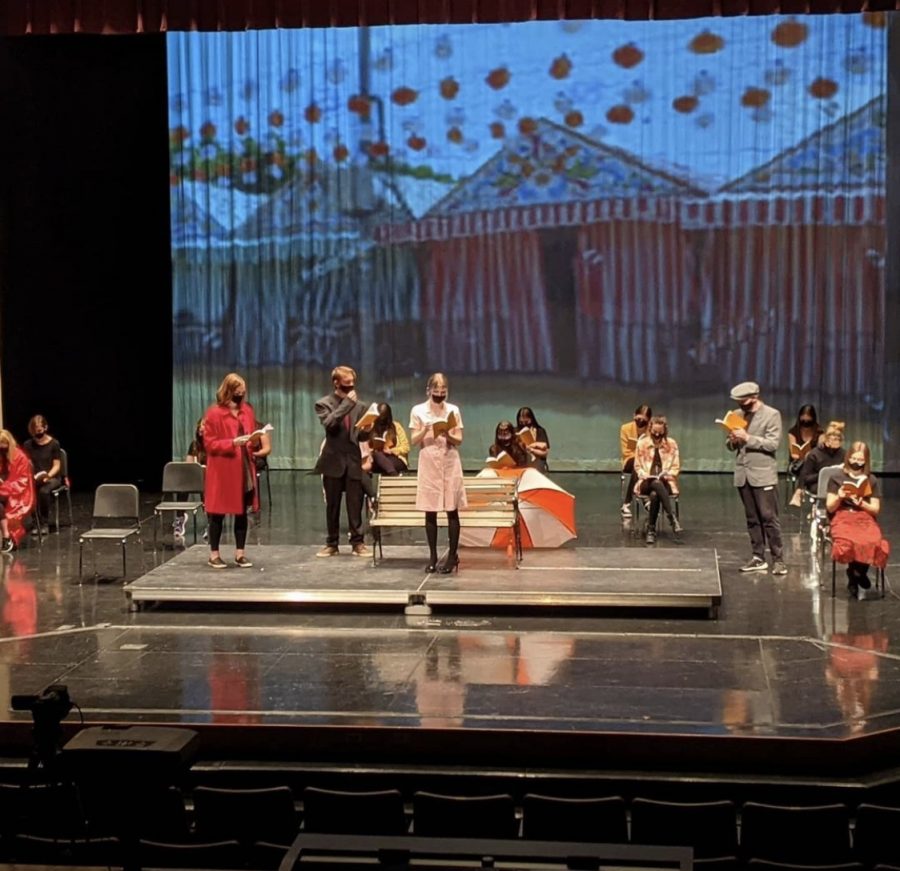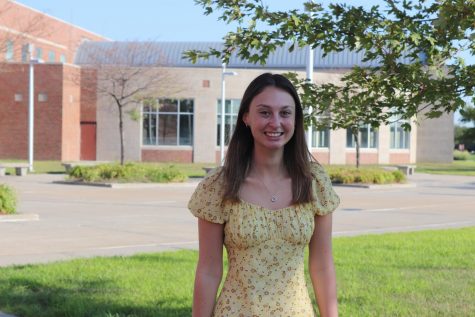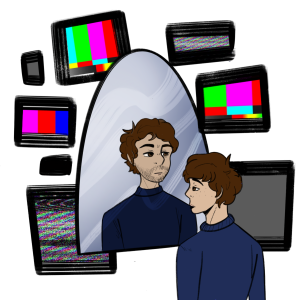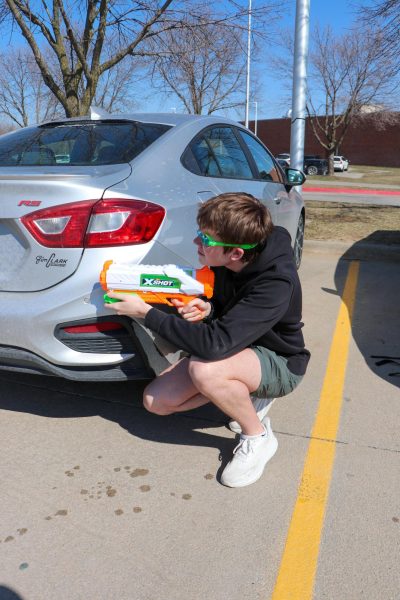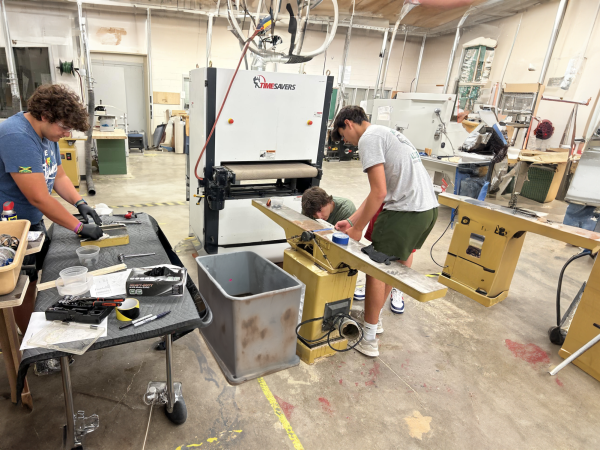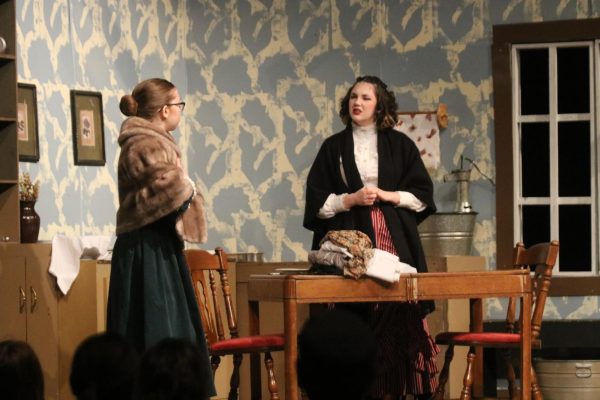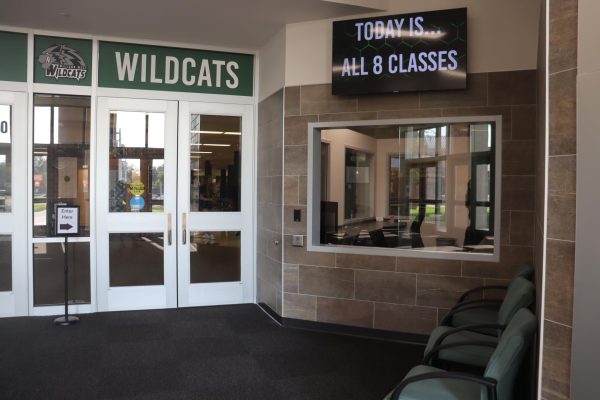A production abridged
The theater department shakes things up with a staged reading
photo courtesy of Millard West Theater
In order to reduce the risk of COVID-19 spreading, the Theater Department decided to livestream the play for people to watch on Striv. Audience members were invited to watch the show from their homes. “The biggest challenge was making it accessible to the audience,” director Brooke Phillips said. “We couldn’t have people come in person so we streamed it live and setting that all up for the first time was really tricky. I picked this play because it is about a family escaping world wide disasters over and over. Humans have survived wars, floods, dinosaurs, an ice age. I wanted people to feel like we could survive this crazy pandemic.”
December 9, 2020
On Thursday, December 3, Millard West Theater performed a staged reading of “The Skin of Our Teeth,” by Thorton Wilder. The play contained a larger cast of 20 students and was live-streamed so people could watch from the safety of their homes. Instead of a fully-staged production, members of the cast sat on black chairs, read from their scripts and did minimal movement when it was their turn to speak.
Throughout the play, the audience follows the troubled marriage of Mr. and Mrs. Antrobus, their tense relationship with their children and the drama caused by their seductive maid, Lilly Sabina. The show takes place through three non-continuous acts: Act one takes place during an ice age, in the second act we see Mr. Antrobus as the newly elected president as a storm approaches and the third act reunites the family after a seven-year-long war. Each character represents a different character from the Bible, and the script makes many references to various Biblical stories. The play is made even more whacky by the occasional interruption of the narrative by the actors breaking character and addressing the audience.
Mr. and Mrs. Antrobus symbolize Adam and Eve, and their maid, Lilly Sabina, is a reference to the myth of Lilith. One of their children, Henry, is a reference to Cain, a Biblical figure who murdered his brother Abel after God favors Abel over Cain. The murder of Abel is a common theme throughout the play, with Mr. Antrobus clearly favoring his third “perfect” child, Gladys and neglecting Henry. In the third act, the tension between Antrobus and Henry boils over and an intense confrontation ensues. With such a complex narrative, actors had to work hard to develop their characters, so the audience could follow along with the storyline.
“To prepare, I went over my Mrs. Antrobus lines many times to make sure I was never confused on stage,” senior Kody Horrocks said. “I had to make sure to differentiate the comic scenes from the more intense scenes like the one in Act two when my character talks about the treatment of women in the media. I liked being able to have a serious subject in the midst of such a crazy play.”
Although the play was originally meant to be performed as a full production, rising COVID-19 cases lead theater director Brooke Phillips to put on the show as a staged reading instead. With this being the first staged reading Millard West Theater has put on, everyone involved worked cohesively to get people engaged. Over a two week period, the cast worked on becoming familiar with their lines and blocking in order to tell the story.
“The show, as a staged reading, felt to me like a show abridged,” Phillips said. “It was sort of a mini performance — not that we did less of the script, but we were way lighter on the production elements. It was such a fun feeling knowing our live performance could have been viewed by millions of people if they had access to our Striv link.”
Despite the minimal technical elements the stage reading required, members of the Theatre Technology class made many designs of all aspects of the show from lighting schemes to models of what the set would’ve looked like. These designs were showcased on a slideshow before the production started, and some were used when planning the show.
“Theatre Technology designed with no limits on what we could do,” senior Samantha Spencer said. “So, at the end of each design lesson, I would take what everyone designed and sort it out to create a design we could use for the reading. The projections had many images of what the class found for the reading. The sound was also a mix of the sounds we gathered in class. My favorite aspect was how we laid out the stage for the reading.”
While the play was not put on traditionally, everyone involved was still able to have an enjoyable experience and explore their acting abilities.
“The staged reading made it feel less stressful and more easygoing,” Horrocks said. “I knew I didn’t need to worry about remembering my lines because I had them right in front of me. Instead, I was able to focus more on developing my character and getting to hang out with the other members of the cast.”
Although the production looked a little different this year, the joy for performing remained the same. Members of the show were ecstatic to have another performance opportunity this year and to showcase their talents for everyone who tuned in.

